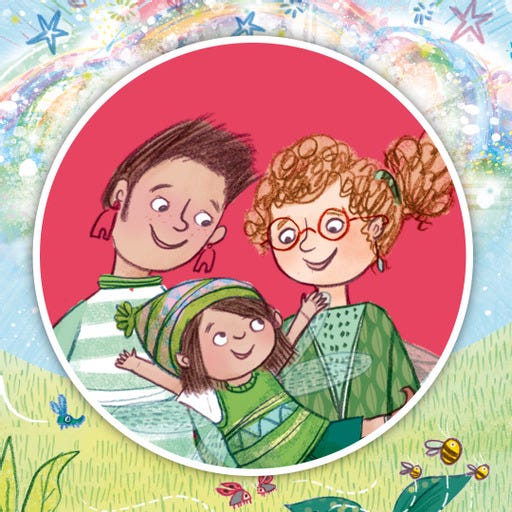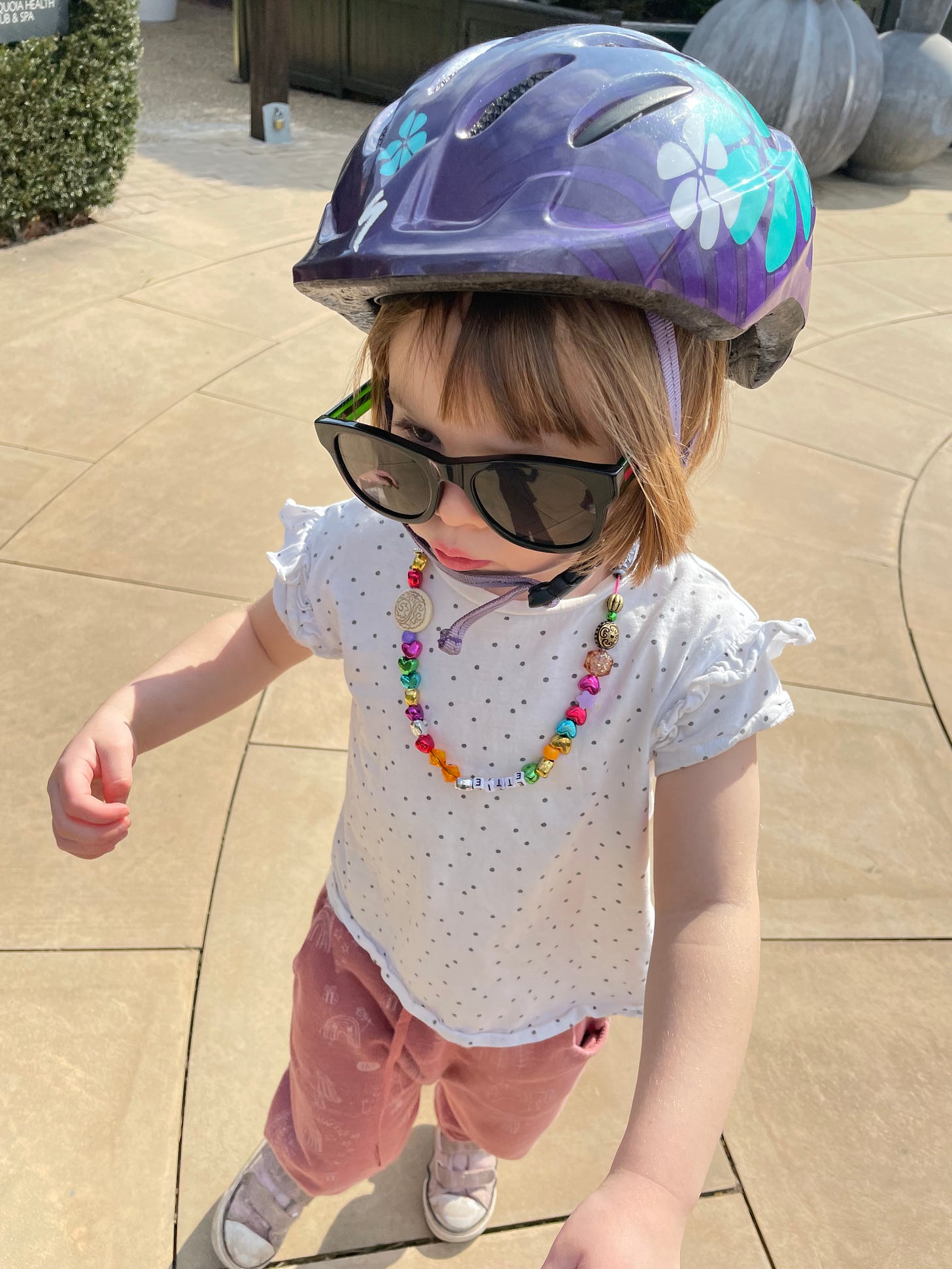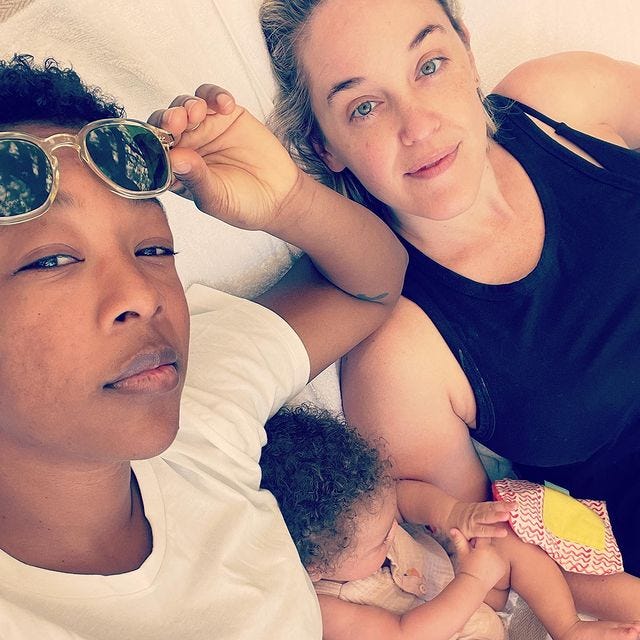“Non biological parent”? I’m not a washing powder!
Plus: Nonuplets, a gay mum in The Whitehouse, and queering the parenting lexicon
“She’s not adopted, she’s my child”. Notice anything wrong with this statement? You’re a Gay-Ze subscriber so of course you do. Sadly Naomi Campbell hadn’t got the memo when she said these words to the Vogue Magazine interviewer profiling her for the April issue. For adoptive parents, and their children, reading this quote is a kick in the teeth. Campbell obviously didn’t mean for it to be upsetting, but it uncovers the kind of deep-rooted assumptions about ‘family’ that many people hold, whether they realise it or not. It was Leon (aka @lots_andlotsoflove), a single Dad via adoption, who first drew my attention to Campbell’s statement on Instagram. ‘A child that you adopted is your child. It doesn’t make you any less of a parent” he wrote.
LGBTQ people know all too well how much the language we use around parenting matters. A casual reference to our daughter’s ‘father’ instead of our ‘donor’ might be a careless mistake to the person who said it, but to us it undermines our entire family.
We might not be biologically connected but our roots twist into and around each other, tying us ever tighter.
Likewise the use of the word ‘real’. My wife was pregnant and that makes me the ‘other mother’, but does it make me any less real? I spend every day of my life (apart from the ones where I’m off on big gay mini-breaks with my friends) taking care of her. We might not be biologically connected but our roots twist into and around each other, tying us ever tighter. That counts for far more than genes in my opinion. Oh, and sidebar: can we ban the phrase “non biological parent” - I’m not a washing powder!
One of my favourite queer parenting anecdotes is the time E was a newborn and my wife and I took her to be weighed. The health visitor insisted on calling me ‘Daddy’ to my clearly unDaddy-like face. I didn’t correct her because I could barely believe it was happening. It was only as we were walking home that J and I looked at each other and burst out laughing.
This is an example of how some people have such a deep seated heteronormative view of ‘family’ that they continue to plaster it on to us even when what they see before them is clearly not conforming to it. Stu similarly has told me about the ‘mother and baby’ class he took his kids to when the instructor continued to say “OK Mums”, without even trying to modulate her language or make it more inclusive in his presence.
I’ve always loved how the class teachers refer to ‘Big People’ and ‘Little People’ it’s so easy and it includes everyone in the room regardless of their relationship to the child or how they identify
I take E to a fab art class called Little Splodgers and I’ve always loved how the class teachers refer to ‘Big People’ and ‘Little People’ it’s so easy and it includes everyone in the room regardless of their relationship to the child or how they identify. I wish this was a more common occurrence.
But people seem to think changing the words we use, or even just adding to them involves some kind of massive administrative upheaval. I remember enquiring about parental leave at the big advertising agency I was working for at the time my wife was pregnant and being sent an application for paternity leave. ‘But I’m not my child’s father, I’ll be her other mother’ I wrote back. I was told the form was the form, there were no alternative options.
The fact the entire HR department neglected to change the references from ‘he’ to ‘they’ or ‘father’ to ‘parent’ before sending me this policy made me feel like my kind of motherhood didn’t count.
It would have made such a difference and was simply a matter of executing the ‘find and replace’ function on Word, but when I suggested as much I was fobbed off – all the company policies needed updating, I was told. It was on someone’s ‘to-do’ list somewhere.
This is partly why I wrote the picture book My Magic Family, which is being published by Puffin Books at the end of the month (sorry to regular readers for banging on about it!). The story centres around a little girl with two mums. She goes on a magical adventure discovering all the different kinds of families her nursery school friends have too. It was interesting, reading an advanced copy of the book at my daughter’s nursery how unfazed any of the three and four-year-olds were by the fact that a character has two Mums, and another has two Dads (there are also single parents, step parents and divorced parents in the book). What they really wanted to know was why one family lived in a giant boot.
These kids haven’t yet been exposed to a society that seems to suggest there is a correct way to have a family, and everything else is a deviation from that. I hope they can keep hold of this open-minded attitude as they get older.
While I wish Naomi Campbell had chosen the words she used about motherhood more carefully, I hugely respect her for keeping the details of her child’s birth private. Why should it matter how she became a Mum? I suppose, because she’s in her 50s there’s a degree of genuine curiosity, but this can so quickly veer into judgement.
This is something I’ve noticed myself. People are naturally inquisitive about how my wife and I had our daughter. But there’s a fine line between this and asking something that makes me feel so ‘othered’ I might as well be from another planet. Like the barista in a café we go to regularly once saying to me, “Oh I can tell she’s your partner’s daughter, they look so alike”. Way to ruin my day.
And just because I’m a part of the LGBTQ parenting community, it doesn’t mean I’m immune from having to really think twice and challenge myself about the way I talk to other non-traditional parents too. I have a neighbour who has just fostered a new born baby. We were chatting recently, and I found myself desperate for details about the birth family – what was wrong with the mother? Why had her baby been taken from her care? But before I opened my mouth, I stopped myself. Why did I need to know? It was absolutely none of my business, and disrespectful to the birth family to think that a stranger would know the intimate details of their personal struggles.
Also, my friend is an excellent and experienced Foster carer and would simply not have told me. Instead, I asked how much she knows about the birth family, which meant I could continue learning about the Fostering process without making it awkward or her having to shut down the conversation.
The language used about parenting by hospitals and other institutions needs to change to reflect the reality of modern families
I’ve also had to bite my tongue when meeting gay Dads via surrogacy. What the nosiest part of me wants to know is “whose sperm did you use to create this child”. But why do I need to know this? This was something Stu and I discussed on this episode of Some Families with Tom Daley’s husband Dustin Lance Black who reminded us that asking this question would inevitably leave one of the Dads feeling ‘less than’ the other and was quite unnecessary.
Engaging this internal filter in conversation is something we can all do. But the language used about parenting by hospitals and other institutions needs to change to reflect the reality of modern families too. We are not asking for this language to replace anything, we just want our experience to be reflected as well. It doesn’t take anything from a cis-het mother to acknowledge the existence of trans and non binary people in the language used around pregnancy, birth and parenting. But it’s often presented as a threat in this way.
I really hope, as families continue to evolve beyond the heteronormative norm, that the language we use evolves too. Look how naturally the word ‘partner’ now trips off the tongue. Even in the 90s it was seen as political correctness gone mad to use this neutral word in place of husband or boyfriend, but now it’s assimilated into modern vernacular we don’t even question it.
What do you think? Let us know your experience in the comments below.
NEWS FLASH!
This man wants to have his dead wife’s baby with a surrogate - discuss!
This woman gave birth to nonuplets and the father says “nappies are not my area” - seriously?
GOLD STAR!
The new US Press Secretary is a gay mum! Karine Jean-Pierre, 44, who takes over from fellow ‘Gold Star’ alumni Jen Psaki on May 13 after serving as her deputy, is the partner of CNN's national correspondent Suzanne Malveaux. The pair have a seven-year-old daughter through adoption. Talk about power couple goals!
What to do When…?
Last week we asked What do You Do When your mother-in-law refuses to treat you as her grandchild’s other Mum because you didn’t give birth to her. Thanks to all of you who beat the glitch in the system (the comment button didn’t work - soz!) and emailed us. Emma, advised: ‘My mother-in-law never treated me as our daughter’s Mum.
She’d never say “go to Mummy”, when she passed me the baby, but would say “Go to Aunty Emma”. It was just plain rude.
She’d never say “go to Mummy”, when she passed me the baby, but would say “Go to Aunty Emma”. It was just plain rude. In the end my wife had a word. She basically said, “Emma is the baby’s Mum too and if you don’t accept that then you can’t be part of our life”. I think it was a shock to her to be confronted in that way as she didn’t realise she’d done anything wrong. She was defensive at first but it’s been better ever since. On Mother’s Day she sent me and my wife flowers saying “to the Best Mums” and that actually brought a tear to my eyes. My advice is that you need to pull the mother in law up on it before it’s too late. And don’t be afraid to give her an ultimatum. It might be the only way she knows it’s serious.’
If you have any similar experiences please share below (hopefully it works this time!) or email lotteandstu@gmail.com
PS. Would you pay £4 a month - that’s less than a London latte - to be a paid up member of the Gay-Ze community? We are thinking of expanding our Substack so this free newsletter continues but we also offer extra for paid members: webinars with experts on all the subjects relevant to gay parenting, as well as more personal insights, voice notes and tips from the two of us? Plus special offers on books and invites to events. It would be a way of showing your support for what we are trying to do with this newsletter, and investing in the independent model of Substack that allows us to say what we want, when we want.













Hi! Commenting seems to be working this week! 😊